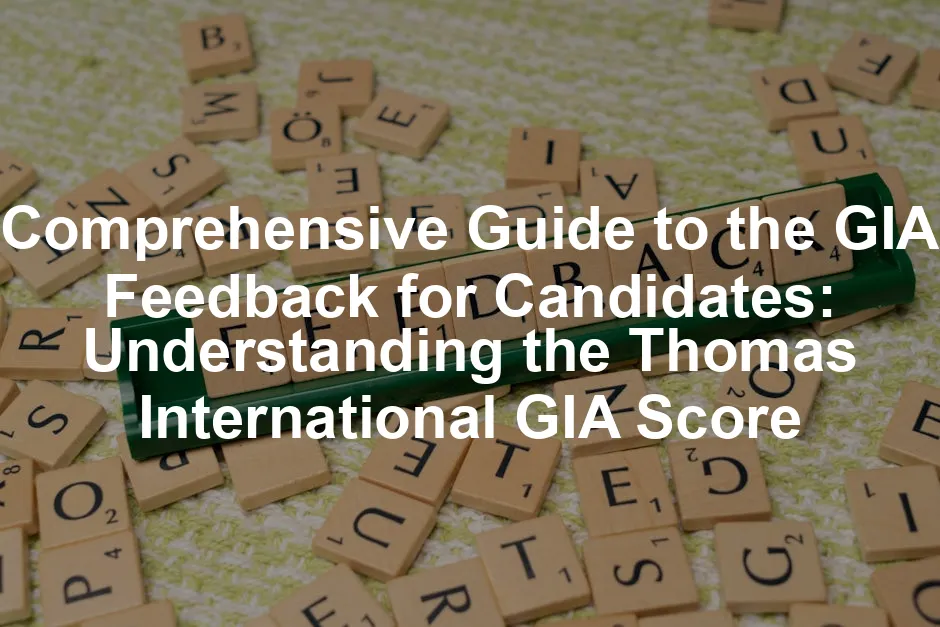Introduction
Have you ever wondered how companies select the right candidates? The General Intelligence Assessment (GIA) plays a vital role in recruitment and talent development. Developed by Thomas International, this assessment helps organizations identify cognitive abilities that predict success. In this article, we aim to shed light on GIA scores and what they mean for candidates.
While you’re pondering that, why not sharpen your mind with some brain teasers? Check out Brain Teasers for Adults: 200 Puzzles to Challenge Your Mind. It’s the perfect way to flex those cognitive muscles!
Summary and Overview
The GIA is a psychometric test designed to measure cognitive abilities. Its primary purpose is to predict job performance by assessing candidates’ aptitude. GIA scores reflect a candidate’s ability to adapt and learn quickly, providing valuable insights during the hiring process. This article covers the GIA structure, scoring method, preparation strategies, and candidate feedback to help you understand its significance.

Understanding the General Intelligence Assessment (GIA)
What is GIA?
The General Intelligence Assessment (GIA) is a psychometric test that evaluates cognitive abilities. Created by Thomas International, it was initially designed for military use but has since evolved for corporate environments. The GIA assesses five key areas: reasoning, perceptual speed, number speed and accuracy, word meaning, and spatial visualization. This assessment predicts potential job performance and helps employers make informed hiring decisions.
The GIA tests your ability to process information quickly and accurately. For example, it evaluates how well you can solve problems, understand verbal instructions, and manipulate visual information. Candidates who score well often demonstrate strong analytical skills and adaptability. Ultimately, the GIA serves as a crucial tool for both employers and candidates in the recruitment process.
Key Components of the GIA
The General Intelligence Assessment (GIA) evaluates five essential areas. Understanding these components can reveal a lot about a candidate’s cognitive abilities.
Perceptual Speed measures how quickly individuals can identify errors and recognize patterns. This skill is vital in fast-paced environments, where quick decision-making is crucial.
Reasoning assesses logical thinking and problem-solving capabilities. Candidates who excel in this area can analyze situations and come up with effective solutions swiftly.
Number Speed and Accuracy focuses on a candidate’s numerical skills. This component tests how well individuals can perform calculations and interpret numerical data, which is often essential in various job roles.
Spatial Visualization evaluates the ability to manipulate and understand visual information. This skill is particularly important in fields such as engineering and architecture, where visualizing structures and designs is key.
Word Meaning assesses vocabulary and comprehension. Strong performance in this area indicates a candidate’s ability to understand and use language effectively, which is vital in many communication-intensive roles.
Each component plays a significant role in assessing overall intelligence. Together, they provide a comprehensive picture of a candidate’s cognitive strengths and potential job performance. By understanding these key areas, candidates can better prepare for the GIA and improve their chances of success in the recruitment process.

Preparing for the GIA
Effective Preparation Strategies
Preparing for the General Intelligence Assessment (GIA) is crucial for success. Here are some effective strategies to help you get ready.
First, familiarize yourself with the test formats and question types. Understanding what you will face can ease anxiety. Each section of the GIA focuses on unique skills, such as perceptual speed and reasoning. Reviewing sample questions online can be a great start.
Next, practice under timed conditions. This test is fast-paced, and managing your time effectively is key. Use a timer while practicing to simulate the real experience. This can help you learn how to pace yourself, ensuring you complete all sections.
Utilizing available resources is another important step. Many platforms offer practice tests tailored to the GIA. Websites like JobTestPrep and How2Become provide materials that mirror the actual test format. Additionally, consider joining study groups or forums. Engaging with peers can provide support and insights.
Another great resource to consider is the GIA Practice Test Workbook. It’s a fantastic tool to hone your skills and get familiar with the test format.
Finally, review your practice test results. Identify areas where you struggled and focus on improving them. Regularly revisiting challenging topics will build your confidence and enhance your abilities.
By implementing these strategies, you can increase your chances of achieving a strong GIA score. Remember, preparation is not just about hard work; it’s about smart work too.

Resources for GIA Preparation
When preparing for the GIA, using quality resources is essential. Luckily, several online platforms offer excellent materials tailored to the test.
JobTestPrep is a popular choice. They provide in-depth practice tests and diagnostic tools. Their materials mirror the GIA’s format, allowing you to practice effectively. You can gain insights into your strengths and weaknesses.
How2Become is another great resource. They offer practice questions and guidance for various assessments, including the GIA. Their detailed explanations help clarify complex concepts.
Mock tests are vital. They simulate the real assessment environment and help you get accustomed to the pressure. Seek feedback from these tests to understand your performance better. This feedback will be invaluable in focusing your study efforts.
Incorporating these resources into your preparation can make a significant difference. Utilizing mock tests and engaging with comprehensive practice materials will enhance your readiness for the GIA.
And don’t forget to check out Speed Reading for Dummies to help you absorb all that preparation material faster!

Candidate Experience and Feedback
Testimonials and Real-Life Experiences
Real-life experiences can offer valuable insights into the GIA process. Many candidates share their thoughts after taking the assessment.
One candidate expressed, “The GIA was challenging but fair. It tested my abilities in a way that felt relevant to the job.” This sentiment reflects the common view that the GIA is a true measure of a candidate’s skills.
Another candidate noted, “I found the timed aspect stressful, but it helped me improve my speed.” This highlights the importance of practicing under pressure. Many candidates mention how preparation helped them feel more confident.
Others have said, “The feedback I received was useful for my growth.” Candidates appreciate the insights into their strengths and areas for development. This feedback can guide future learning and improvement efforts.
Overall, candidates generally agree that the GIA is a valuable tool. It not only assesses abilities but also provides insights that can aid in personal growth. Engaging with these experiences can prepare future candidates for their own GIA journey.

Analyzing GIA Feedback
Understanding your GIA feedback report is essential for your growth. The report provides insights into your cognitive strengths and areas needing improvement. By focusing on these insights, you can develop a clearer understanding of your potential.
First, examine your overall score. This score reflects your cognitive abilities compared to a norm group. Higher scores indicate strong problem-solving skills and quick information processing. Review each section of the report, such as reasoning and perceptual speed, to identify where you excelled and where you might struggle.
Next, pay attention to the specific feedback provided. For instance, if your perceptual speed score is high, you likely process visual information quickly. This strength can be beneficial in roles requiring fast decision-making. Conversely, if you find lower scores in reasoning or word meaning, it’s an opportunity to enhance these skills.
Identify key areas for development. The GIA report will often highlight these. For example, if number speed and accuracy are lower, consider focusing on mathematics or analytical tasks. Developing these skills can lead to improved performance in future assessments or job opportunities.
Lastly, remember that GIA feedback is not just about scores. It’s about your journey toward personal and professional growth. Use this information to create a plan for enhancing your abilities. Seeking additional training or resources can provide the support you need to improve.
Speaking of growth, why not explore “The Art of Learning: An Inner Journey to Optimal Performance” by Josh Waitzkin? It’s a fantastic read for anyone looking to improve their skills and mindset!

Best Practices for Candidates Post-GIA
Utilizing Feedback for Growth
After receiving your GIA feedback, it’s time to take action. Use the insights from your report to create a personal development plan. This plan should focus on harnessing your strengths while addressing any weaknesses.
Start by setting specific goals. For example, if you scored low in reasoning, aim to improve it through practice. Consider enrolling in courses that enhance analytical skills. Online platforms offer numerous resources to help you develop in this area.
In addition, seek feedback from peers or mentors. Sharing your GIA results can foster discussions about your strengths and areas for growth. This collaborative approach often leads to valuable insights. Your peers may offer perspectives on how to leverage your strengths in the workplace.
Moreover, apply your GIA insights in real-life situations. Look for opportunities to use your strong cognitive skills in daily tasks. This practical application reinforces learning and boosts confidence.
Lastly, consistently reflect on your progress. Regularly revisit your goals and adjust them as needed. This ongoing process ensures you remain committed to personal and professional growth.

Preparing for Future Assessments
Preparation is key for success in future assessments. Start by reviewing your GIA results and identifying areas for improvement. Understanding where you struggled helps you focus your efforts effectively.
Create a study plan that aligns with your goals. Incorporate regular practice sessions that simulate the GIA format. Using timed practice tests can enhance your speed and accuracy. Many online platforms offer practice materials specifically for the GIA.
Additionally, consider joining study groups. Collaborating with others can provide motivation and support. Discussing challenging concepts with peers can deepen your understanding. You’ll benefit from diverse perspectives and shared resources.
Stay informed about new assessment formats or changes in the GIA. Continuous learning keeps you prepared for any evolving requirements. Following blogs, attending workshops, or engaging in relevant online communities can be beneficial.
Finally, maintain a positive mindset. Confidence plays a significant role in performance. Remind yourself of your strengths and past successes. A positive attitude can help reduce test anxiety and enhance focus.
By following these strategies, you can improve your readiness for future assessments and job opportunities. Remember, each assessment is a chance for growth and learning. Embrace the journey ahead with enthusiasm.
Conclusion
The General Intelligence Assessment (GIA) is crucial in recruitment. It helps employers gauge a candidate’s cognitive abilities and potential job performance. Understanding your GIA score can empower you in your career journey.
Feedback from the GIA should be seen as a tool for growth. It’s not just about the score; it’s about what you can learn from it. Each piece of feedback highlights your strengths and areas for improvement, guiding your development.
Engaging with your results constructively is vital. Reflect on the feedback, and don’t hesitate to seek resources for further learning. Consider taking courses, practicing skills, or even discussing your results with mentors. Your GIA journey can become a stepping stone to greater success.
And while you’re on your journey, why not explore “The 7 Habits of Highly Effective People” by Stephen R. Covey? It’s a classic for a reason!

FAQs
What is the General Intelligence Assessment (GIA)?
The GIA is an assessment that measures cognitive abilities. It helps predict how well candidates can learn and adapt.
How are GIA scores interpreted?
GIA scores range from low to high, indicating a candidate’s cognitive strengths. Lower scores suggest areas for improvement, while higher scores indicate strong abilities.
What types of questions are featured in the GIA?
The GIA includes questions on reasoning, perceptual speed, numerical skills, visual-spatial abilities, and vocabulary.
How can I prepare for the GIA effectively?
Familiarize yourself with test formats, practice under timed conditions, and use online resources for sample questions.
What should I do if my GIA score is lower than expected?
Use the feedback to identify weak areas and create a development plan. Consider additional training or practice in those areas.
Is the GIA used by many employers?
Yes, many organizations in various fields use the GIA to assess candidates during the hiring process.
Can I retake the GIA if I’m not satisfied with my score?
Policies on retaking the GIA vary by employer. Check with the organization for their specific guidelines.
Please let us know what you think about our content by leaving a comment down below!
Thank you for reading till here 🙂
For a deeper understanding of reading statistics in Georgia, you can explore this comprehensive overview.
All images from Pexels




